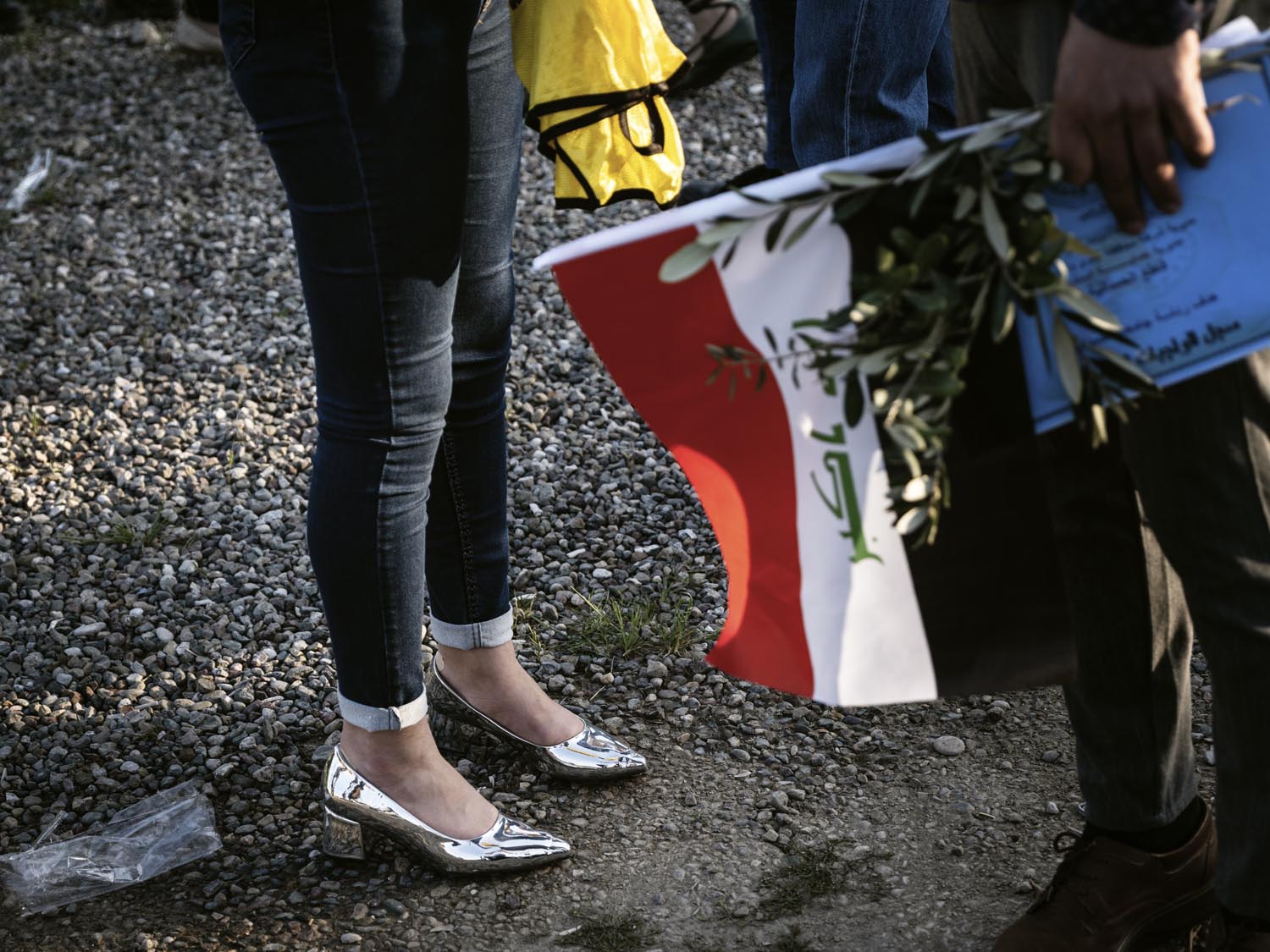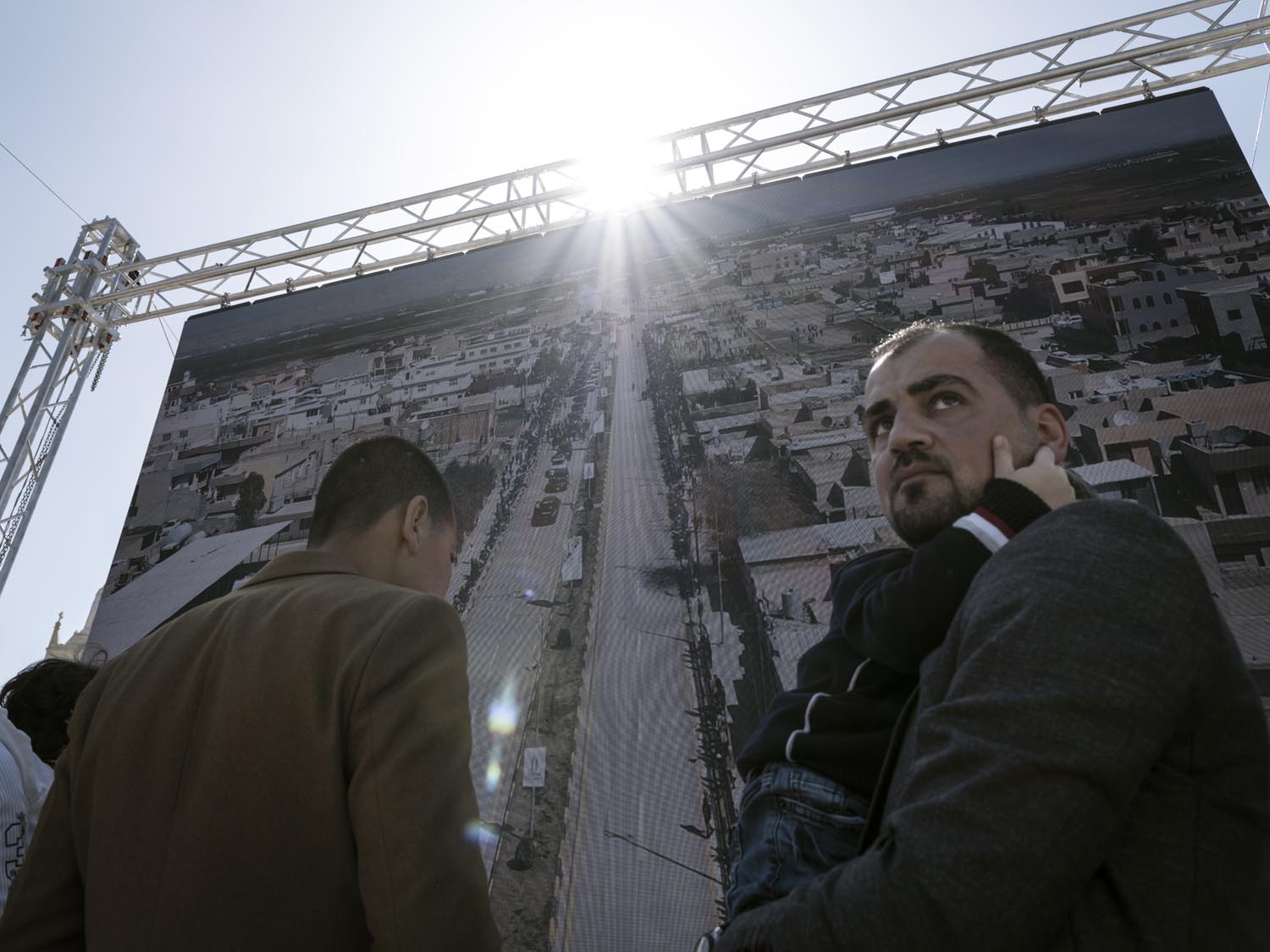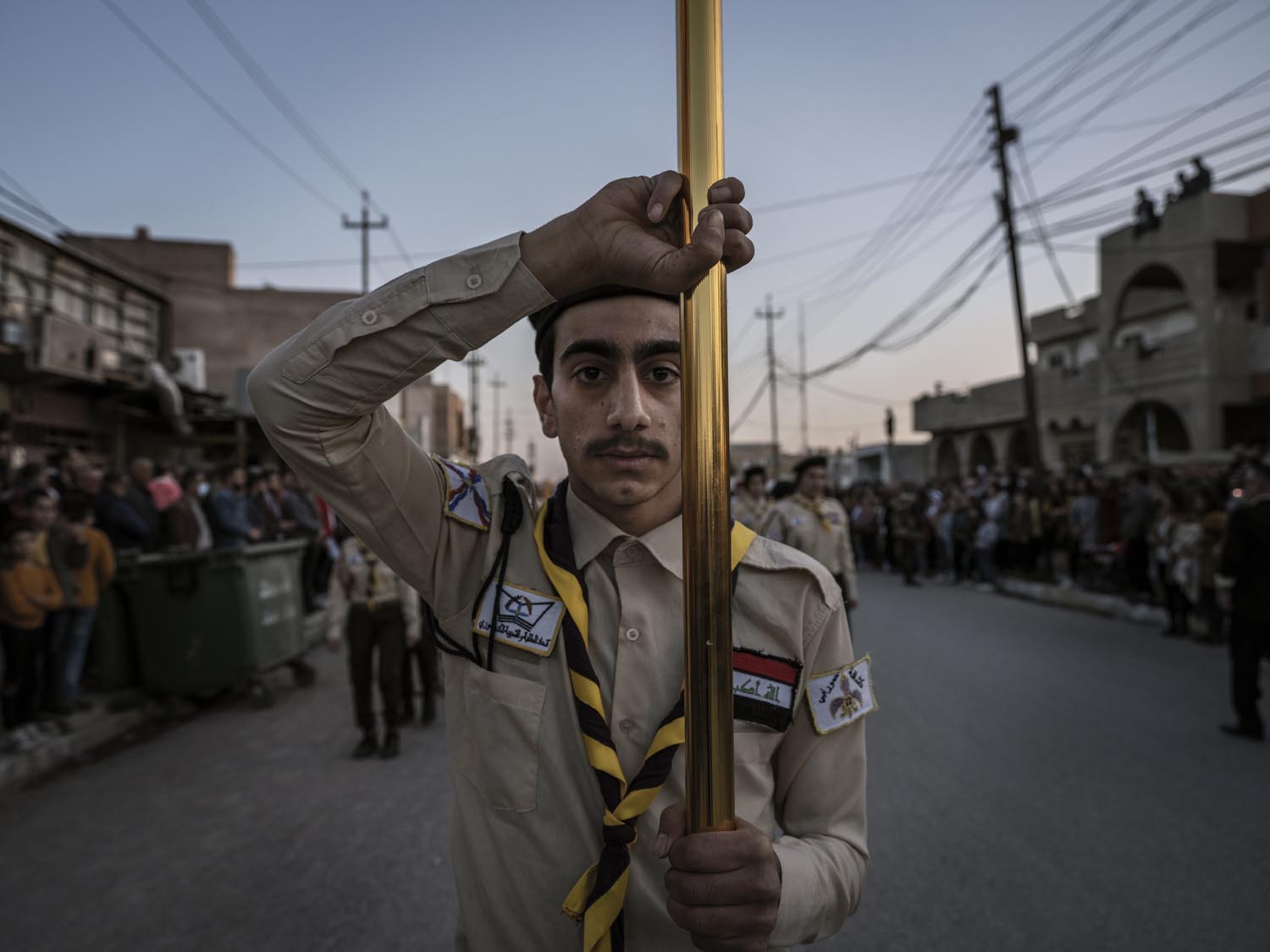OPERATION CINEMA -Shooting in Iraq
Destroyed houses, rubble, piles of garbage where goats, sheep, dogs and cows search for something to eat, competing with dozens of children and teenagers. The Shiite militias militarily control the territory. The noise of the tuk tuks merges, only partially softened, with the singing of the Muezzin. Everywhere the wounds of years of war, especially the last one, against Daesh, remind us where we are.
Dyala, south of Baghdad. One of the most degraded and dangerous suburbs of the city.

Dyala, Iraq. An old village chosen as the location for one of the most important scenes of the movie “Hanging gardens”
Right here, a group of young filmmakers decided to rent a house and use it as the headquarters for the production of the film Hanging Garden.
They are Iraqis, some exiles, forced to leave the country for London or Paris after the 2011 protests, but who have not given up on their dream, that is of making films in their own country.

Dyala, Iraq. While waiting for the right light for the shooting, the final indications are given to the actors.
And it is a cinema that has the flavor of narrative purity, which arises from the need to tell the Iraq of today, denouncing money waste, corruption, repression and above all the effects of the years of war.

Dyala, Iraq. The crew of the movie “Hanging gardens” seen through the glass of a Tuk Tuk, the cheapest and most popular means of transport in the southern suburbs of Baghdad, usually driven by poor kids. Tuk Tuks have become the symbol of the 2019 revolution: they were used by protesters, in Tahrir Square in Baghdad, to maintain contacts, distribute drinks and newspapers and, if necessary, transport the injured.
Wareth Kwaish is a young director who now lives in Paris, who ran away after making the film “once we were here”, secretly filming the 2011 protests with his phone.
“We have nothing else to do, we only know how to make films, we love cinema and our country, and there are so many stories to tell. We survive thanks to the cinema. – We fight through cinema. I am for the revolution, I was in the streets in 2011, but today, in this political context, a revolution would not be possible”

Dyala, Iraq. The doll protagonist of the film “Hanging gardens”, in the house chosen as the production site, in an area with a strong presence of Shiite militias.
The situation in the country is dramatic. Despite being one of the most important oil producers in the world, 32% of the population, over 13 million Iraqis, live below the poverty line and youth unemployment is 40%. Electricity is supplied from 5 to 8 hours a day, the health system is almost non-existent and in a third of the country, in the territory conquered by Daesh, almost all the essential infrastructures, roads, bridges, airports, power lines and above all houses, must be rebuilt.

Qaraqosh, Iraq. Outside the university, people prepare for the parade along the streets of the city on the occasion of the pope’s visit.
Despite everything, the end of the war and the liberation of the country brought a wave of optimism and hope among the people. The first visit of a Catholic Pope to Iraq, a historical event long dreamed of by the Christians of the Nineveh Plain, seems to be a point of no return in the process of normalization of the country. In Qaraqosh, one of the stages of the papal visit, I witness festive scenes very far from the images we are used to seeing when it comes to Iraq. Thousands of young people, families, women, men dancing and singing in the street. Music resounds in every alley and square, groups of teenagers dressed up proudly wave the Iraqi flag, where, during the occupation of Daesh, black flags dominated.
In this social, political and economic context, cinema or, more generally, the narration of the country, becomes an instrument of denunciation but of hope too.
We meet Ali Fadel on the set of Melon City Show, the most famous Iraqi political satire sketch comedy, with 12 million followers on YouTube.
Already from the name, the mission of Melon City Show is to denounce, within the limits of the possible and the censorship, the corruption of the government. In fact, the name of the show is the translation of an Arab proverb, which means a city in which there is no organization or control, due to the absence of the government.
Ali tells us that the show has received hundreds of offenses and threats, but the large following, especially online, gives hope that the new generations will be much more receptive to the messages and topics that are conveyed every week from the Melon City stage.

Baghdad. Iraq. The studio of the Arab world’s most popular comedy show, Melon City Show, which has over 12 million followers on You Tube. The show takes its name from an Arabic proverb, in which melon city means a city without rules. Despite the threats received for the topics covered, the show is a great success
From Baghdad, we move to Sulaymaniyah, in Iraqi Kurdistan, the second pole for film and television productions. The apparent calm and tranquility does not hide the tensions of this area of the country. Just a few days before our arrival in Erbil, the airport was hit by a missile attack, reflecting the political and military instability, aggravated by an economic crisis due to the fall in the price of crude oil, on which 80% of the revenues of the autonomous region depend, and the situation linked to the spread of Covid.
Despite everything, we meet Yadeen, a young Iraqi director who moved to London, who has never abandoned the dream of creating the basis for a true Iraqi film industry. His initial idea was to open a production house in Baghdad, but with the arrival of the Islamic State he preferred, for security reasons, he moed to Kurdistan.

Sulaymanieiyah, Iraqi Kurdistan – Yad Deen – The director, born in Iraq, but raised in London, shot his latest film in Iraq, in an old cigar factory, and now, together with other artists and film makers, he is creating, inside the factory, a creative hub for artists and directors.
Yadeen’s dream begins in Sulymaniyah, in an old cigar factory abandoned for years. With the help of other artists, photographers, filmmakers and collectives, they are transforming the facility into a creative hub that in the near future will become a real center of film production. Yadeen seems to have very clear ideas for the development of a real film industry in Iraq, an industry that can above all also attract large foreign productions, thanks to the variety of locations in the country, from the mountains, to the sea or the desert and thanks to the simplification of bureaucratic procedures for filming. If all this is possible, it will be thanks to young people like him who have not given up the dream of being part of the reconstruction of their country, and who will be remembered as the pioneers of the rebirth of Iraqi cinema.

Sulaymanieiyah, Iraqi Kurdistan – The exterior of the former cigar factory, now converted into a cultural hub for artists and film makers.
The desire for rebirth and redemption becomes even more evident in Mosul, the stronghold of the Islamic State and the city where the caliphate was proclaimed.
Skeletons of buildings devastated by bombs, collapsed bridges, and gashes of heavy artillery open in walls already battered by machine gun bullets; the destroyed buildings seem to have caged the echo of the explosions.
The battle for the liberation of Mosul is one of the fundamental and bloodiest episodes of the country’s liberation from Daesh, so much so that it is the subject of Netflix’s first production on the country, with the film Mosul.
Here, in a surreal setting, in an amusement park on the banks of the Tigris, we meet the filmmaker Ahmed al Najj. His words contain the sense of the need to make films in Iraq, of the urgency not to forget: “We need your support, a help to the young people of Mosul, to get them out of the darkness, death and destruction in which they live. The young people of Mosul, the young Iraqis, are a message of peace, pain and hope that the whole world must listen to. I want to tell the story of Mosul, the story of this sad city, the story of its death and its siege. The story of all the people who were killed here every day and whose voices no one listened to.
The Impression on GFX100S
“There are situations where speed is of the essence. I admit that initially I was a bit scared at the idea of using a medium format in Iraq, especially for making videos, that is, outside my comfort zone as a photojournalist. As soon as I picked up the GFX100S in Baghdad, the feeling was immediate, as if I had been using it for months. The dimensions, even smaller than some reflex cameras, also allow freehand use, thanks also to excellent stabilization. Ergonomics and menus are designed to allow even those arriving from the photographic world to use immediate video, with a very convenient switch that allows you to switch from one function to another very quickly. In a difficult context like the Iraqi one, without the possibility of using artificial lights, the yield even at high ISO is impressive. The files are spectacular, with a cinematic paste capable of immediately returning the sensations and experiences lived on the spot. The flat shot allows an infinite range of postproduction and color correction possibilities. According to the editing team, editor and cinematographers, itis a machine for making cinema. In general, for the first time, we have the incredible quality of medium format available without the constraints of size and difficulty of use. For those who make reportage, photos or videos, It simply means being able to tell a story better, and bring our readers and viewers even more into the reality we have documented.”

Qaraqosh, Iraq. A few steps from the Church of the Immaculate Conception “where Pope Francis, on the occasion of the first historic visit of a Catholic Pope, will celebrate Holy Mass, thousands of people follow on their screens the arrival of the papal procession in the city. Qaraqosh was occupied by Isis from 2014 to 2016 and the Pope’s visit is an opportunity to celebrate the return to a normal life.


















































